Vermont Documents
Quitclaim Deed
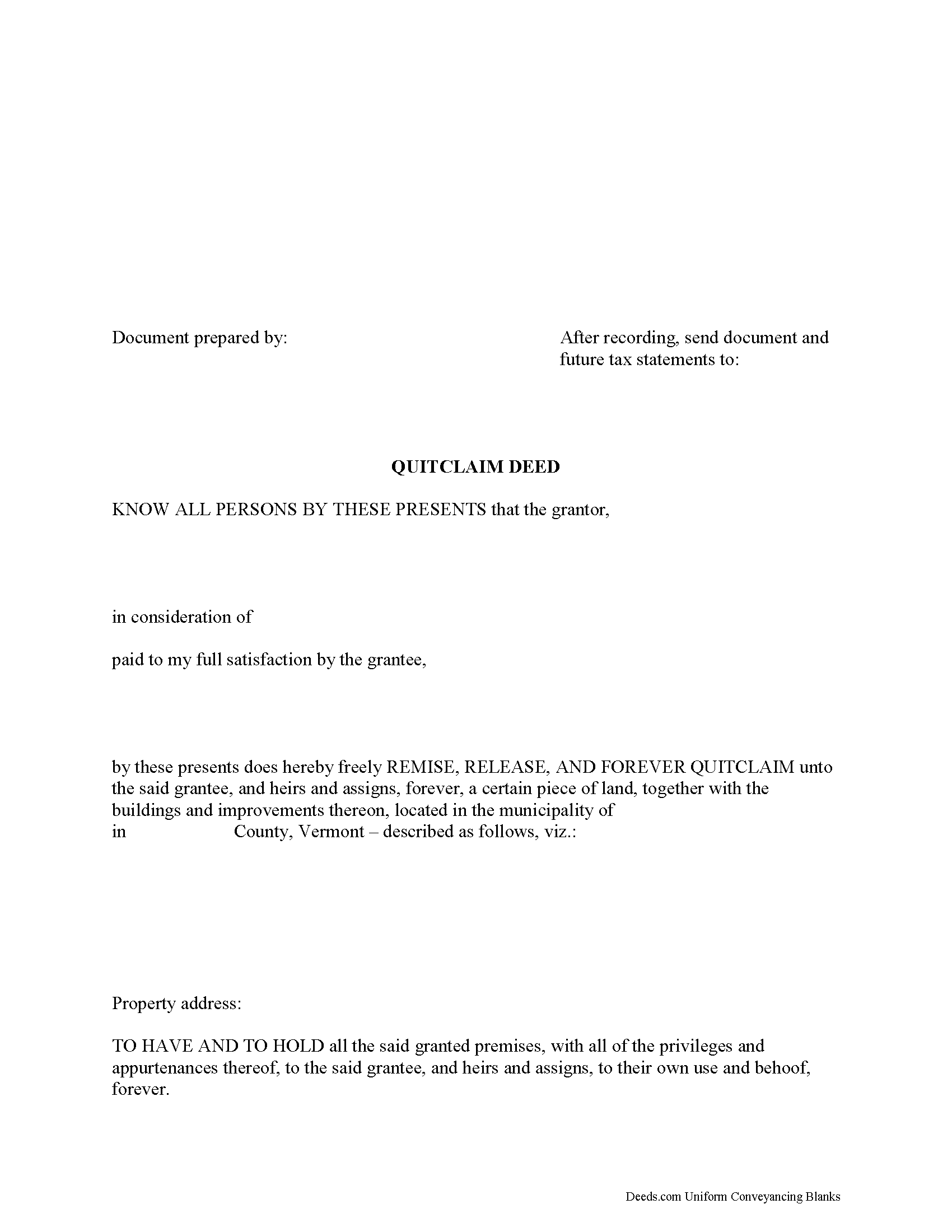
In order to have a quitclaim deed admitted to record in Vermont, it should be signed by the party granting the real estate, acknowledged by the same, and recorded in the clerk's office in the town where the property is situated. Unlike many other states that employ a county recording system to record quitclaim deeds and other real property instruments, Vermont uses a town recording system. Vermont quitclaim deeds use traditional legal language to convey the grantor's interest in real property.
Unless a quitclaim deed is acknowledged and recorded in the appropriate town clerk's office in Vermont, it will not effectively hold lands against any person but the grantor (V.C.A. 342). Recording a Vermont quitclaim deed provides notice of its contents. If a later buyer is paying fair value for property, and a quitclaim deed related to that property has not been recorded, the buyer does not have notice of earlier conflicting interests. If the later buyer records the quitclaim deed first, that deed would have priority over later recordings.
(Vermont QD Package includes form, guidelines, and completed example)... More Information about the Vermont Quitclaim Deed
Gift Deed
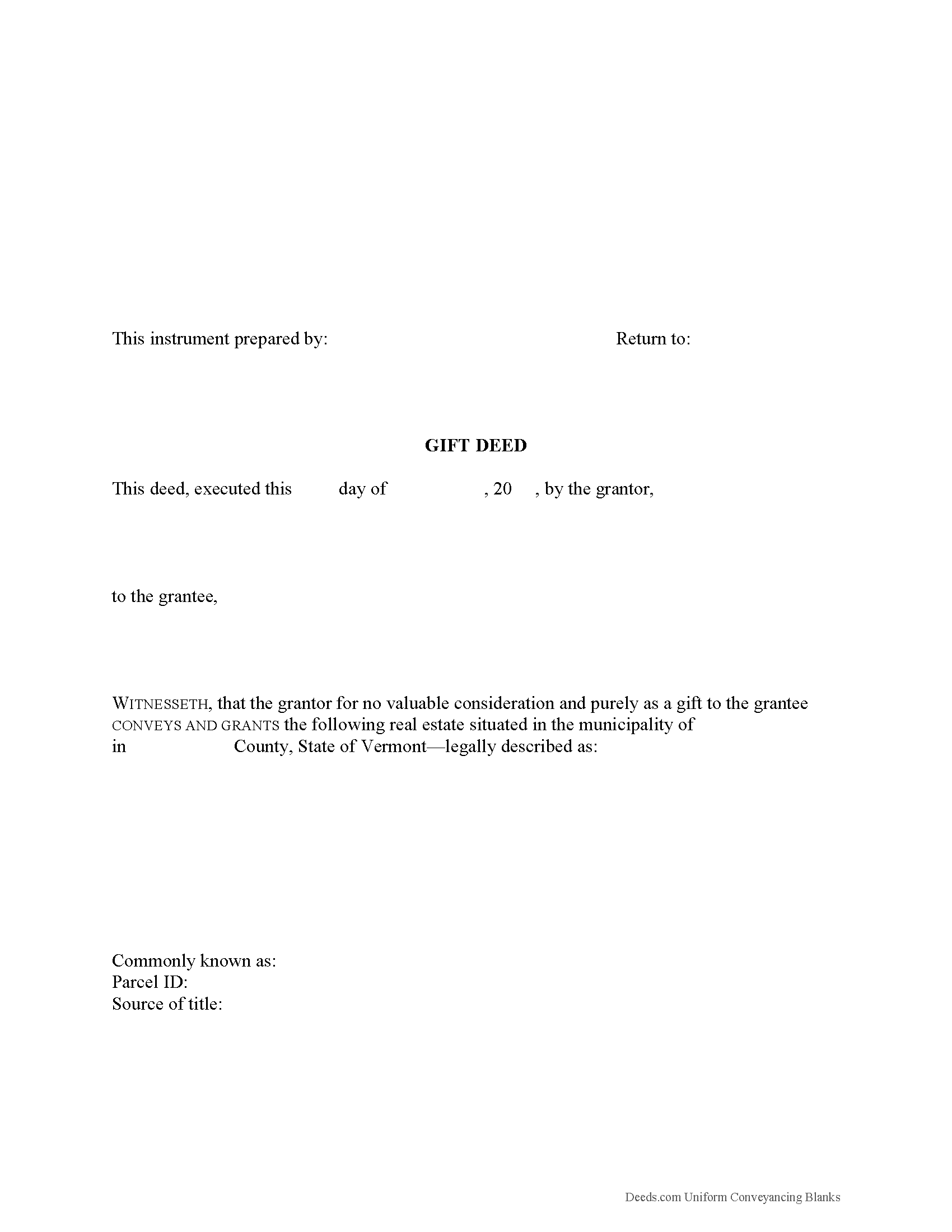
Gifting of Real Estate in Vermont
A gift deed, or deed of gift, is a legal document voluntarily transferring title to real property from one party (the grantor or donor) to another (the grantee or donee). A gift deed typically transfers real property between family or close friends. Gift deeds are also used to donate to a non-profit organization or charity. The deed serves as proof that the transfer is indeed a gift and without consideration (any conditions or form of compensation).
In order for a gift deed to be valid they must meet the following requirements: The grantor must intend to make a present gift of the property, the grantor must deliver the property to the grantee, and the grantee must accept the gift. A gift deed must contain language that explicitly states no consideration is expected or required, because any ambiguity or reference to consideration can make the deed contestable in court. A promise to transfer ownership in the future is not a gift, and any deed that does not immediately transfer the interest in the property, or meet any of the aforementioned requirements, can be revoked [1].
A lawful gift deed includes the grantor's full name and marital stat... More Information about the Vermont Gift Deed
Warranty Deed
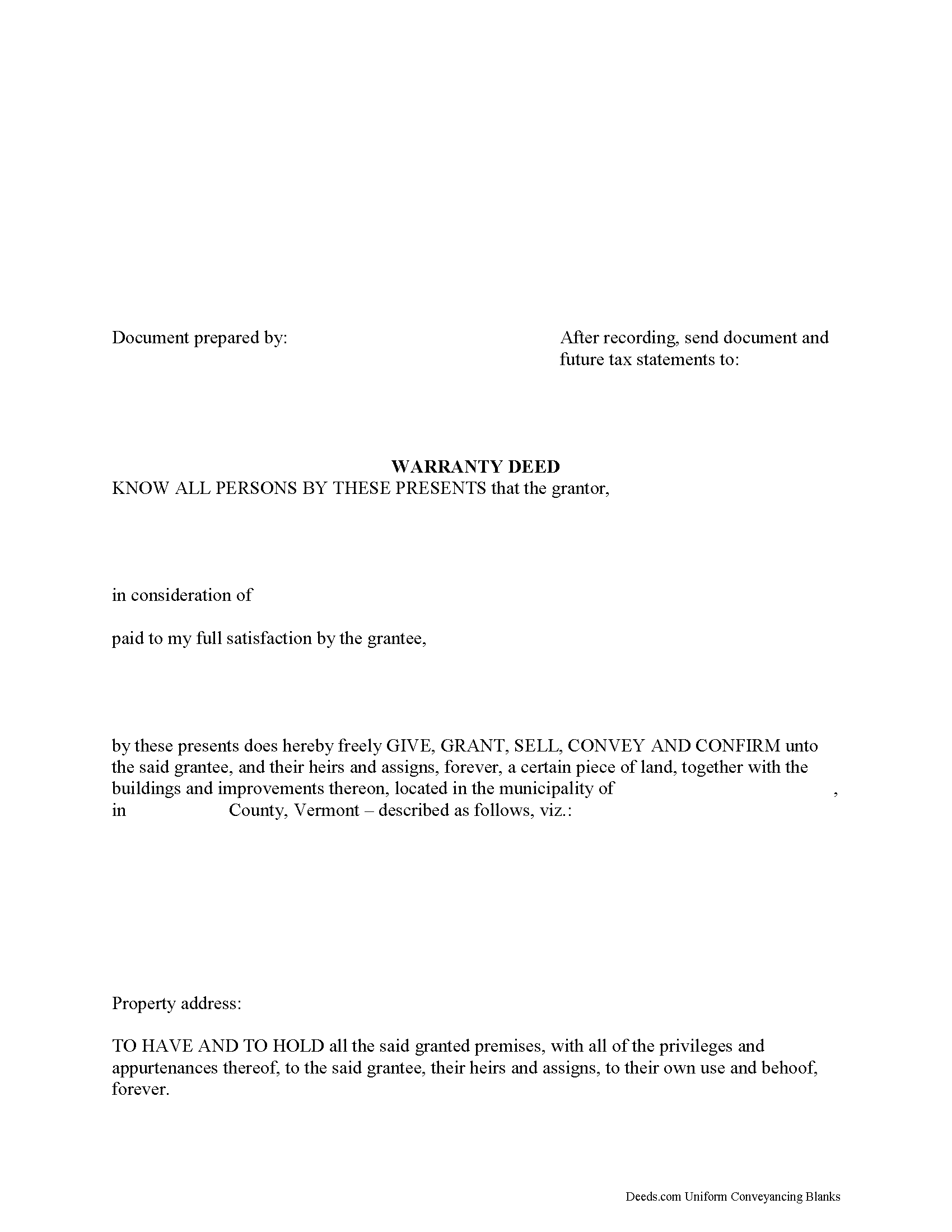
A conveyance of real estate in this state can be made by a deed in writing. Vermont does not have a statutory deed form. Statutory forms from other states should not be used for real estate deeds. Common law legal language is used in deeds. The grantor in a warranty deed in Vermont generally covenants to the grantee that the grantor is the sole owner of the premises being conveyed and has good right and title to convey the property. The grantor also covenants that the property is free from all encumbrances, except as mentioned in the deed. The general warranty deed also includes a covenant from the grantor to warrant and defend the title against all lawful claims and demands. A warranty deed is commonly used in both residential and commercial real estate transactions.
A warranty deed should be signed and acknowledged by the grantor before it can be recorded. Acknowledgments can be taken before a town clerk, notary public, master, county clerk, or judge or register of probate before the warranty deed is recorded in the town where the land subject to the deed is located. An acknowledgment before a notary public will be valid without an official seal being affixed to the notary's ... More Information about the Vermont Warranty Deed
Enhanced Life Estate Warranty Deed
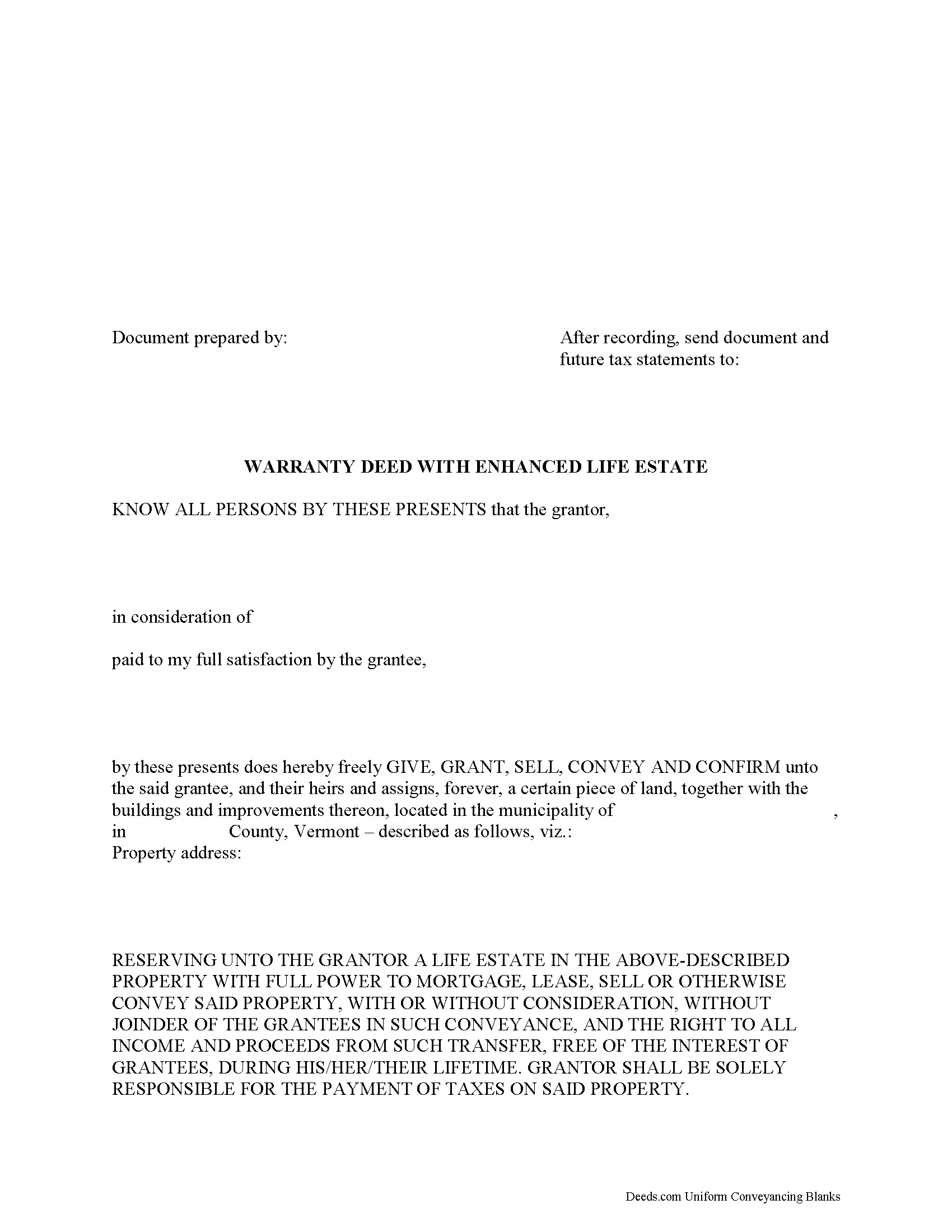
Using Enhanced Life Estate Deeds in Vermont
Owners of real property located in Vermont have access to a useful estate planning document: the Enhanced Life Estate Deed.
In most cases, traditional warranty or quitclaim deeds convey a present interest in property, meaning that as soon as the grantor (seller) signs the deed, the grantee (buyer) owns the land. One way to forestall the transfer is to use a life estate, which allows the owner to keep possession until death. The grantee becomes what's known as a remainderman, or someone who holds a remainder interest in the property during the owner's life. To protect that interest, the grantee must agree to changes in the property's use. Note that transfers initiated under traditional deeds and life estates are permanent.
Enhanced life estate deeds, also known as Ladybird or Granai deeds, convey a revocable future interest in real estate, with the transfer of the remaining title rights to take place when the grantor (owner) dies. These deeds reserve all present ownership rights for the owners, including the right to sell, lease, mortgage or convey the property, with no obligation for notice to or authorization from the grantees... More Information about the Vermont Enhanced Life Estate Warranty Deed
Special Warranty Deed
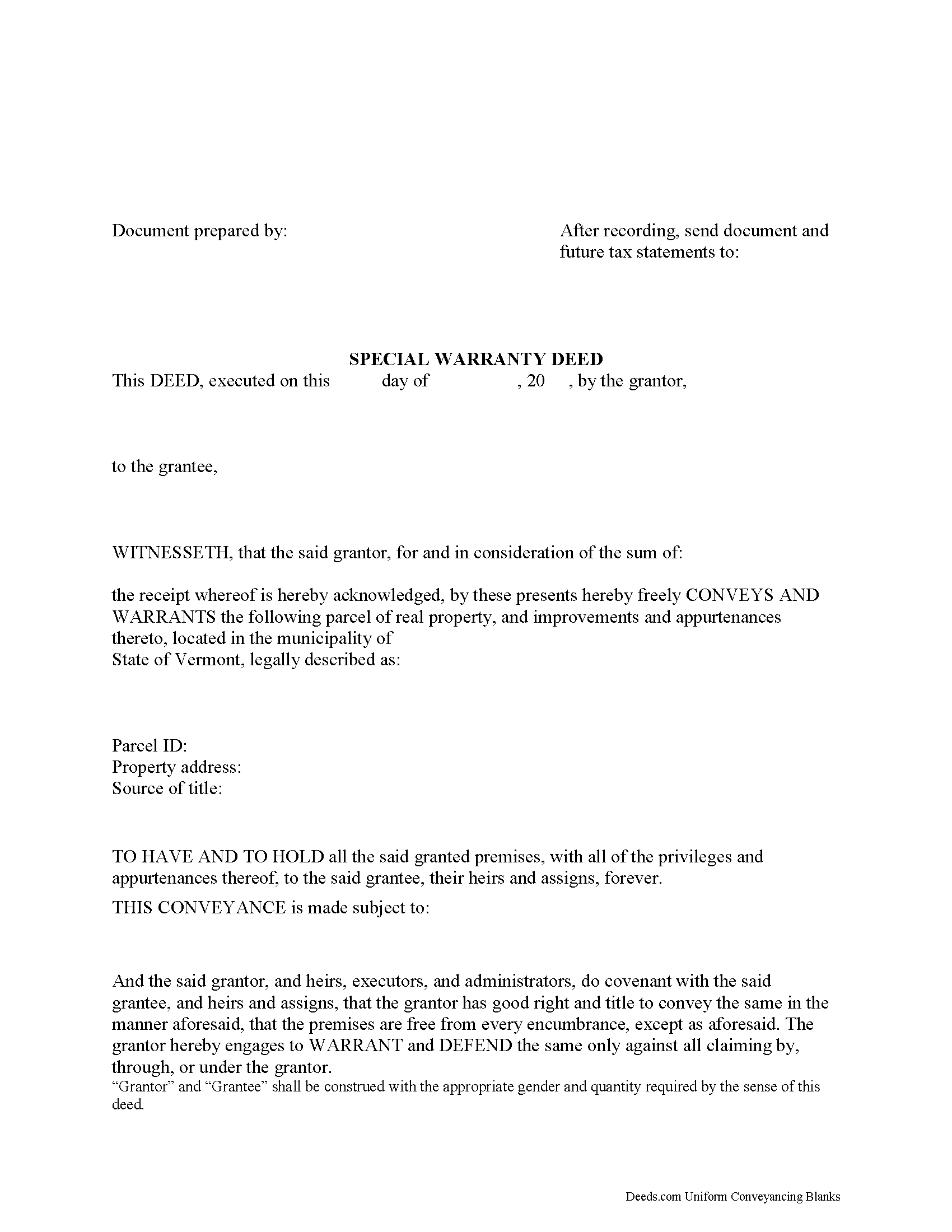
A limited warranty deed can be used in Vermont to convey title to real property. This type of deed is commonly used to convey property acquired through foreclosure. Limited warranty deeds are also used when a seller is unwilling to give a full warranty deed and the buyer is not willing to accept a quitclaim deed. There are no statutory deed forms for this state; common law legal language should be used in creating a limited warranty deed. The grantor in a limited warranty deed covenants that he is in lawful possession of the premises being conveyed and has good right and title to convey the same. There is also a covenant from the grantor to warrant and defend the title against all lawful claims and demands of persons claiming by, through, or under the grantor.
A limited warranty deed in Vermont must be signed by the grantor and acknowledged by the grantor before a town clerk, notary public, master, county clerk, judge, or register of probate before it can be recorded. An acknowledgment before a notary public in Vermont will be valid without an official seal being affixed to the notary's signature (27 341a). Notarial acts can be performed in Vermont or in another state. If a de... More Information about the Vermont Special Warranty Deed
Grant Deed
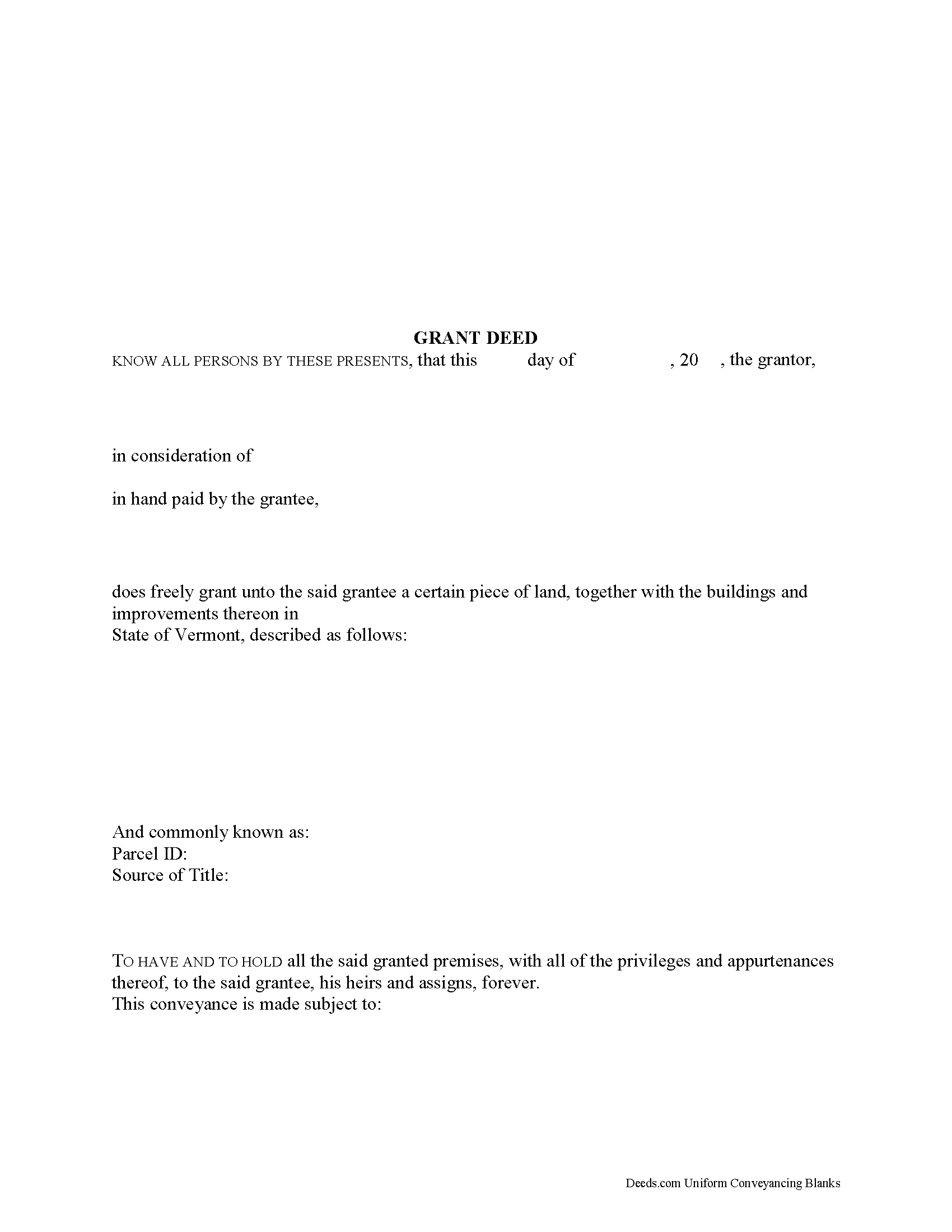
In Vermont, title to real property can be transferred from one party to another by executing a grant deed. Use a grant deed to transfer a fee simple interest with limited covenants of title. The word "grant" in the conveyancing clause typically signifies a grant deed, but it is not a statutory form in Vermont.
Grant deeds give the grantee more protection against claims on the property than quitclaim deeds, but less than warranty deeds. Quitclaim deeds offer no warranty of title, and only convey the grantor's interest, if any, in the subject real estate. Grant deeds guarantee, through implied covenants, that, to the grantor's knowledge, the title is free of any encumbrances (except for those stated in the deed) and that the grantor holds an interest in the property and is free to convey that interest. A warranty deed provides the highest level of protection for the grantee because, unlike the grant deed, it requires the grantor to defend against all claims on the title.
A lawful grant deed includes the grantor's full name, mailing address, and marital status; the consideration given for the transfer; and the grantee's full name, mailing address, marital status, and vesting. Ve... More Information about the Vermont Grant Deed
Correction Deed
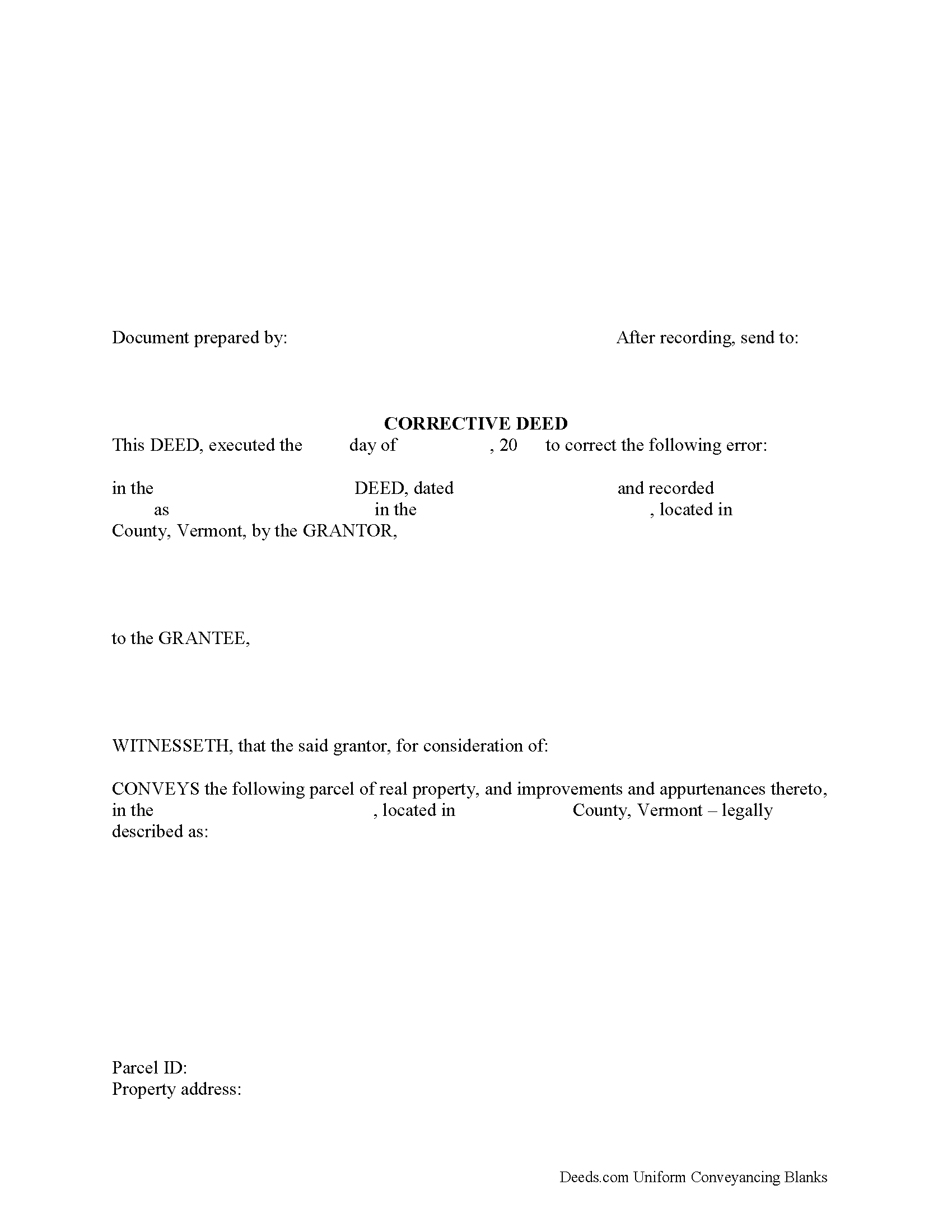
Use the corrective deed to correct an error in a previously recorded deed of conveyance, such as a warranty or quitclaim deed, in Vermont.
Correcting an error in a recorded deed helps prevent problems that might arise when the current owner tries to sell the property. The best method for correction is to prepare and record a new document, often called a corrective or correction deed. This document does not convey title; instead, it confirms the prior conveyance of the property.
Apart from supplying the correct information, the new deed must give the reason for the correction by identifying the error. It also must reference the prior deed by title, date, and recording number. The original grantor has to sign again, which confirms the property transfer to the grantee. Generally, corrective deeds are used to address minor errors in a deed, such as typos, accidentally omitted suffixes or middle initials of names, and other minor omissions. When correcting the legal description, both grantor and grantee should sign the corrective instrument to avoid doubt regarding any portions of the conveyed property.
For certain changes, however, a correction deed cannot be used. According... More Information about the Vermont Correction Deed
Easement Deed
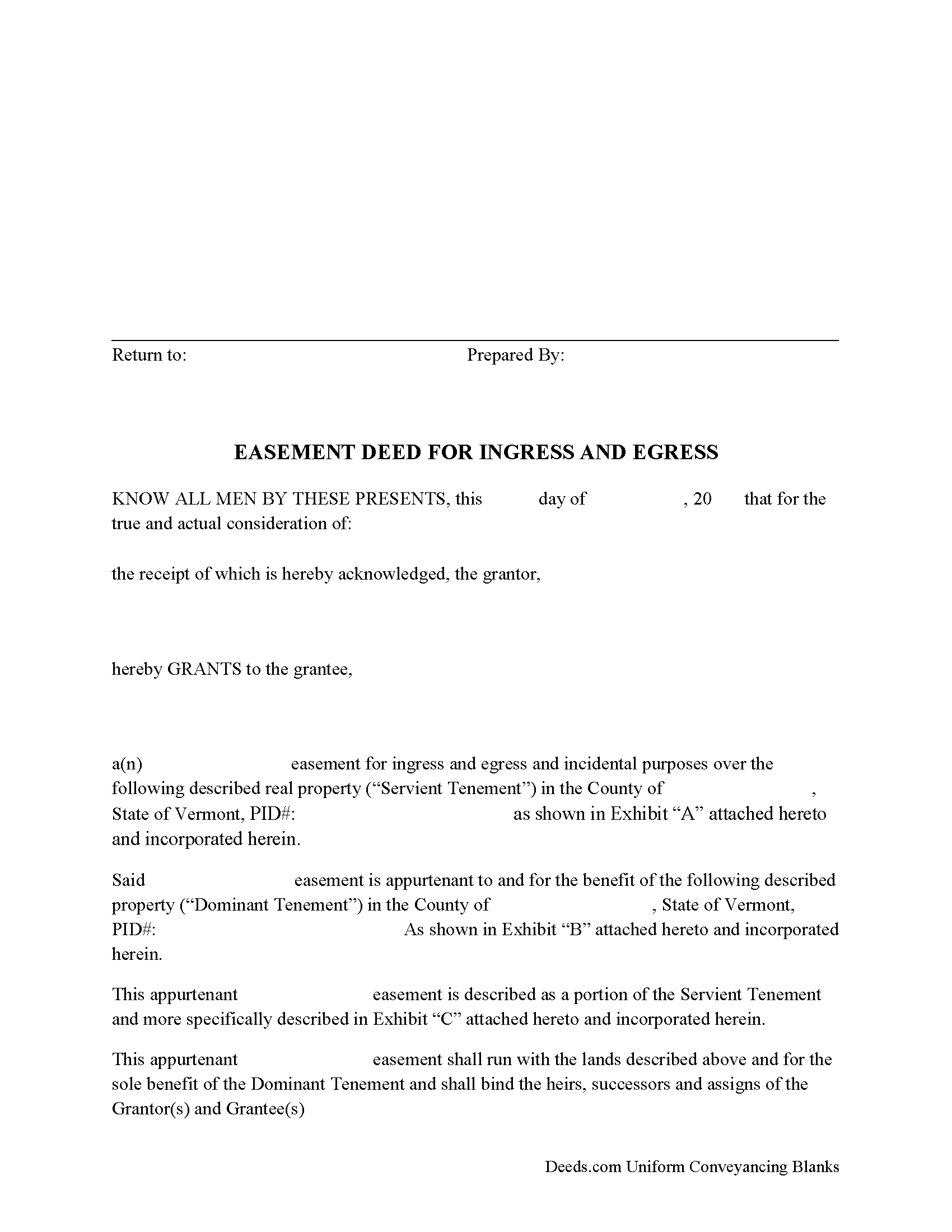
An easement can be created by a grant or deed, by implication, or by prescription. An easement created by a deed should be in writing and should define the terms and scope of the agreement. This type of real property instrument creates a non-possessory interest in land that allows one person to use another's property for a specific purpose.
As an interest in real property, an easement deed in Vermont is required to be signed and acknowledged by the grantor before recording can take place. The acknowledgment of a deed in Vermont can be taken before a town clerk, notary public, master, county clerk, or judge or register of probate. Acknowledgments taken before a notary public will be valid without an official seal being affixed to the notary's signature (27 V.S.A. Statute 341a). Vermont recognizes acknowledgments taken out of state if the acknowledgments are taken according to the laws of such state (379).
Real estate documents in Vermont are recorded in the town or city where the property is located. This is different from many other states that have a county recording system. Recording an easement deed will impart constructive notice of the contents of the instrument. Unles... More Information about the Vermont Easement Deed
Termination of Easement
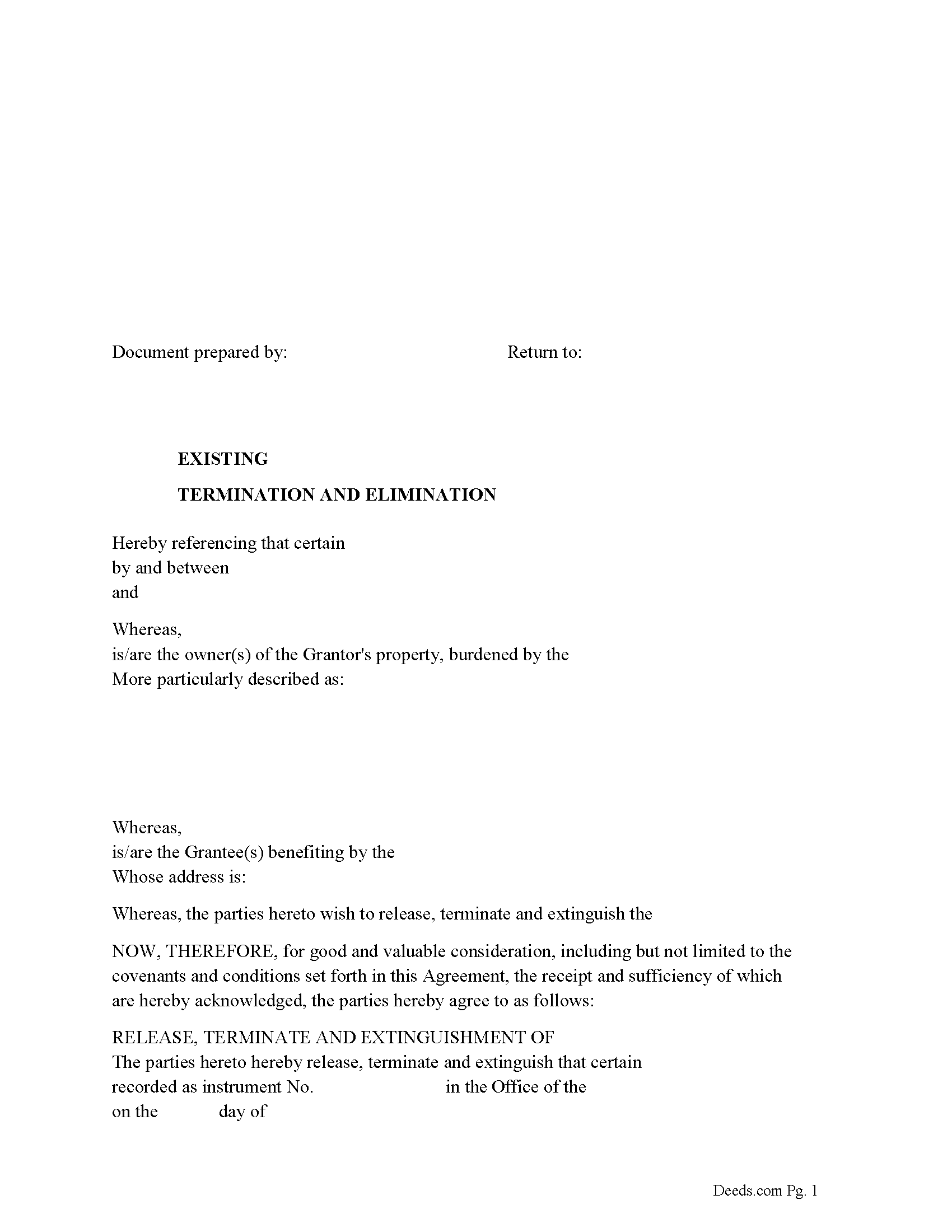
Use this form to release, terminate, extinguish a previously recorded document that involves access to and from a property.
Documents such as:
1. Easement Deeds or Agreements (An easement is a non-possessory interest in land, granting the right to use someone else's property for a specific purpose, like a driveway or utility line)
2. Access Roads
3. Right of Ways
4. Utility Easements (Power, Gas, Water, Sewer, Etc.)
5. Drainage Easements
This document allows the owner of the land, burdened by the access and the party that benefits from the access, to sign an agreement releasing the property from such access, ... More Information about the Vermont Termination of Easement
Trustee Deed
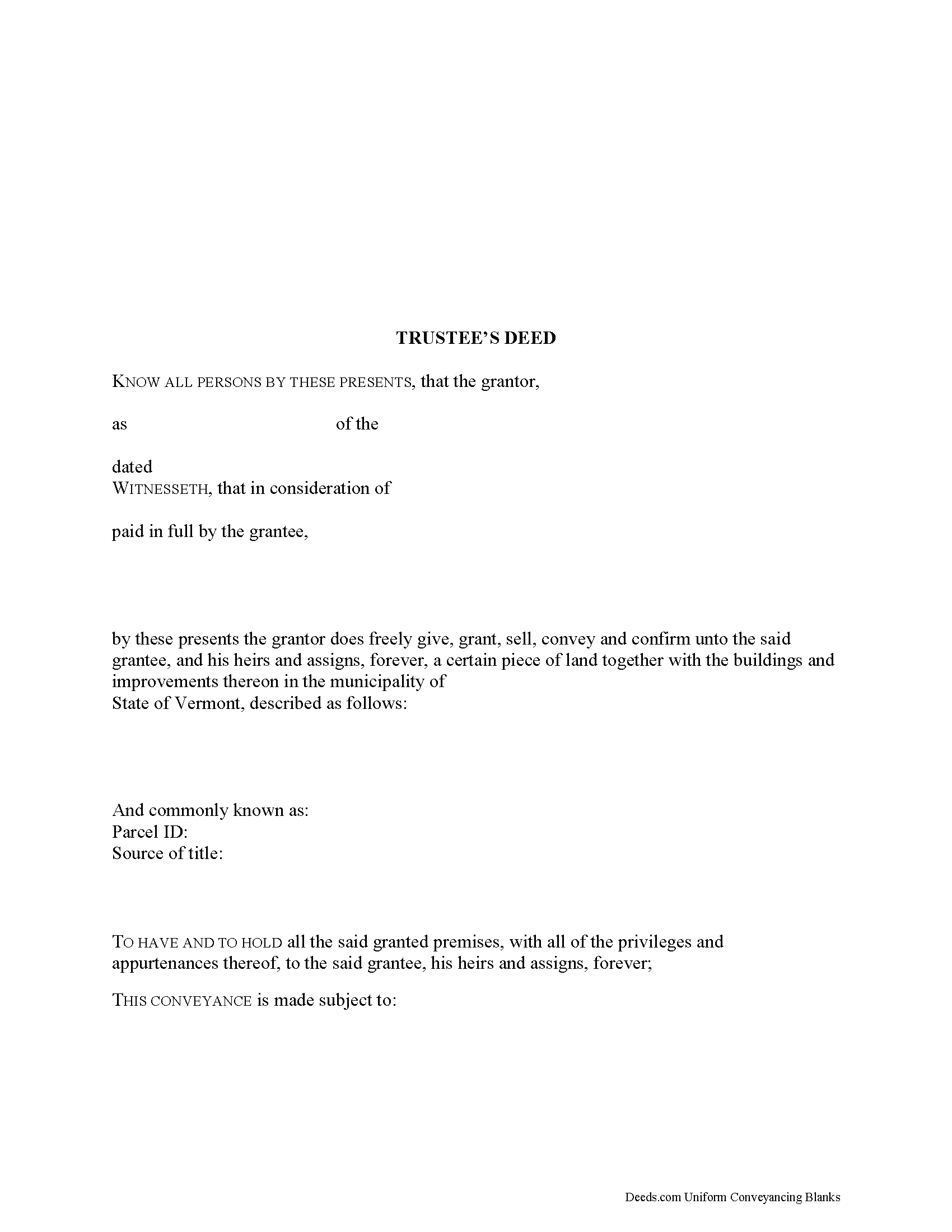
A trust is an alternate method of vesting title to real property. In a trust arrangement, a settlor transfers property to another (the trustee), who administers the trust for the benefit of a third (the beneficiary). These roles may be combined in a single individual, except as noted below. Trusts that take effect during a settlor's lifetime are called living (inter vivos) trusts, and trusts that take effect upon a settlor's death pursuant to the terms of a will are called testamentary trusts.
In Vermont, a valid trust is created when a settlor has a capacity to create a trust and indicates the intention to do so; the trust has a definite beneficiary and the terms of the trust are for the benefit of said beneficiary; the trustee has duties to perform; and the same person is not both the sole trustee and sole beneficiary of the trust (14A V.S.A. 4-402). Further, the trust's purposes must be lawful and possible to achieve (14A V.S.A. 4-404).
A living trust is an estate planning tool that benefits a settlor during his lifetime, and allows the settlor to specify how the trust's assets are to be administered and for the benefit of whom upon his death. In addition to statute, a V... More Information about the Vermont Trustee Deed
Administrator Deed
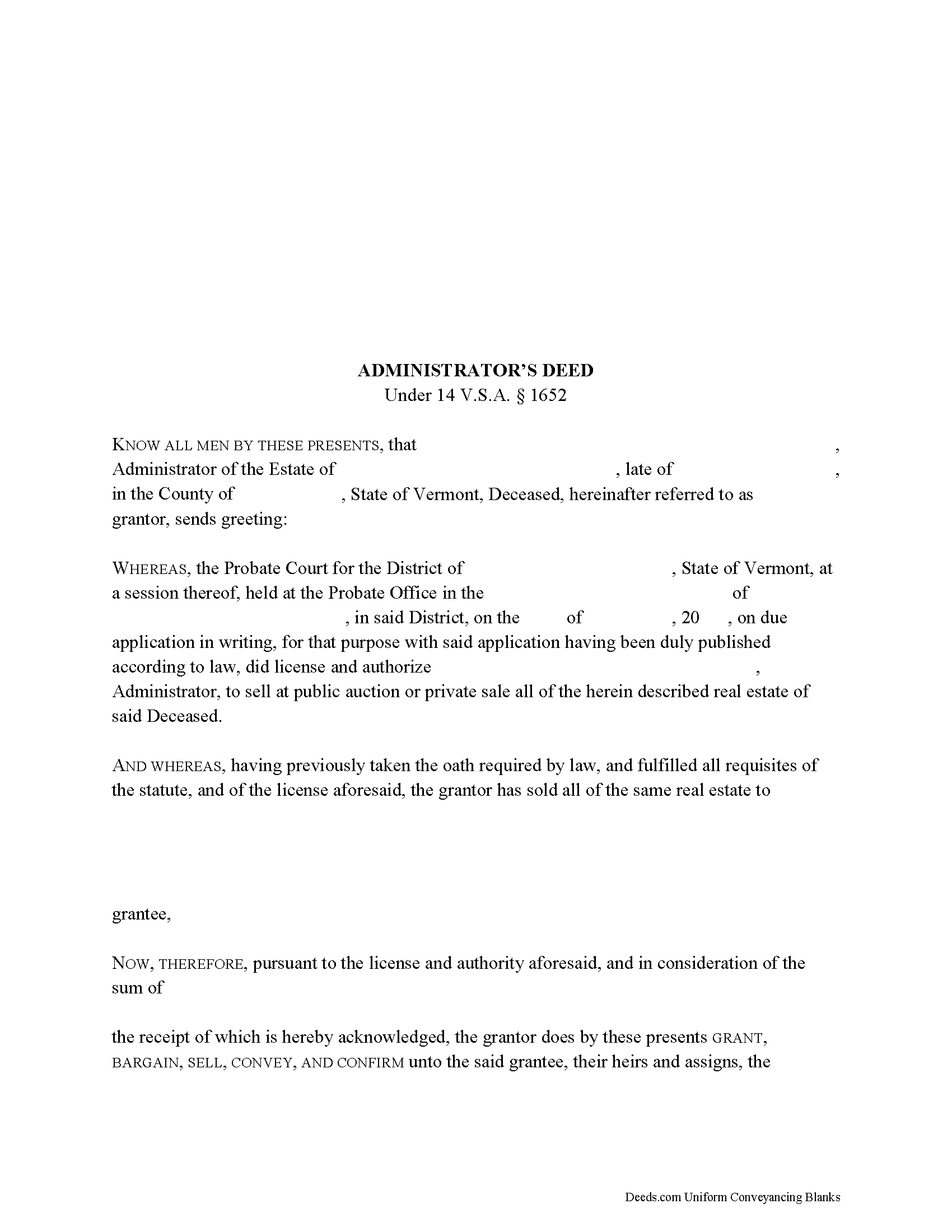
Vermont administrator's deed
Probate is the court-supervised process of settling an estate and distributing the remaining assets to beneficiaries following a property owner's death. An administrator is a court-appointed personal representative assigned to probate the estate when the decedent dies without a will (intestate) or fails to name an executor of his estate.
By operation of law, the title of a decedent passes to her devisees or heirs upon death, subject to a lien of the administrator for payment of debts, expenses of administration, and other expenses legally chargeable against the estate.
If the decedent's debts outweigh his assets, the administrator must sell property from the estate. Personal representatives of an estate may not sell real property without first obtaining a license from the probate division of the superior court. Following petition by the administrator, the Register of the probate court executes and records the license in the land records of the town or city where the property to be sold is situated.
Following a sale of real property, the administrator executes and records an administrator's deed under 14 V.S.A. 1652. The deed contains covenan... More Information about the Vermont Administrator Deed
Executor Deed
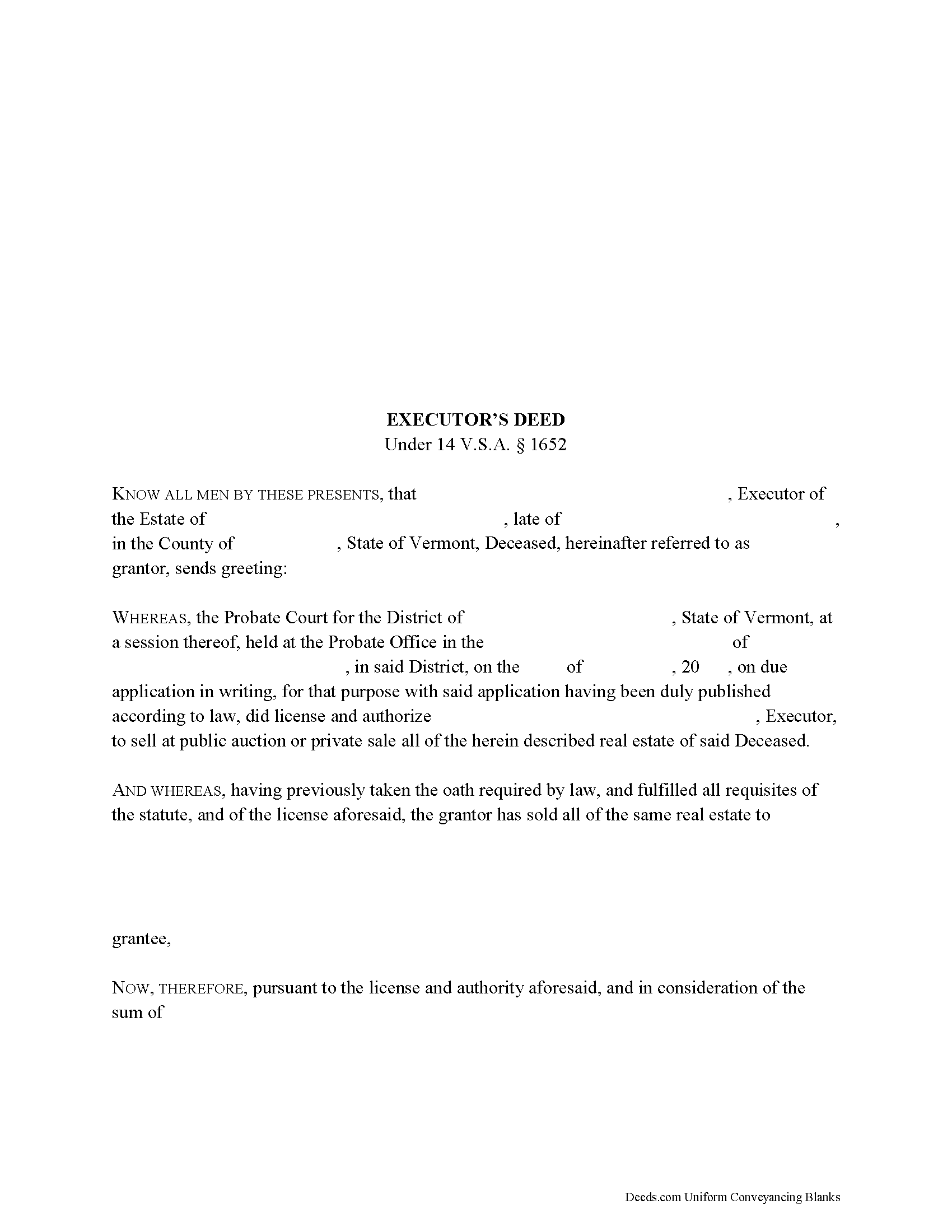
Probate is the court-supervised process of settling an estate and distributing the remaining assets to beneficiaries following a property owner's death. An executor is a personal representative named in the decedent's will to administer his estate.
By operation of law, the title of a decedent passes to her devisees or heirs upon death, subject to a lien of the personal representative for payment of debts, expenses of administration, and other expenses legally chargeable against the estate.
If the decedent's debts outweigh his assets, the executor must sell property from the estate. Personal representatives of an estate may not sell real property without first obtaining a license from the probate division of the superior court. Following petition by the executor, the Register of the probate court executes and records the license in the land records of the town or city where the property to be sold is situated.
Following a sale of real property, the executor executes and records an executor's deed under 14 V.S.A. 1652. The deed contains covenants of special warranty, whereby the executor warrants to defend the title against claims stemming from the time the decedent held tit... More Information about the Vermont Executor Deed
Disclaimer of Interest
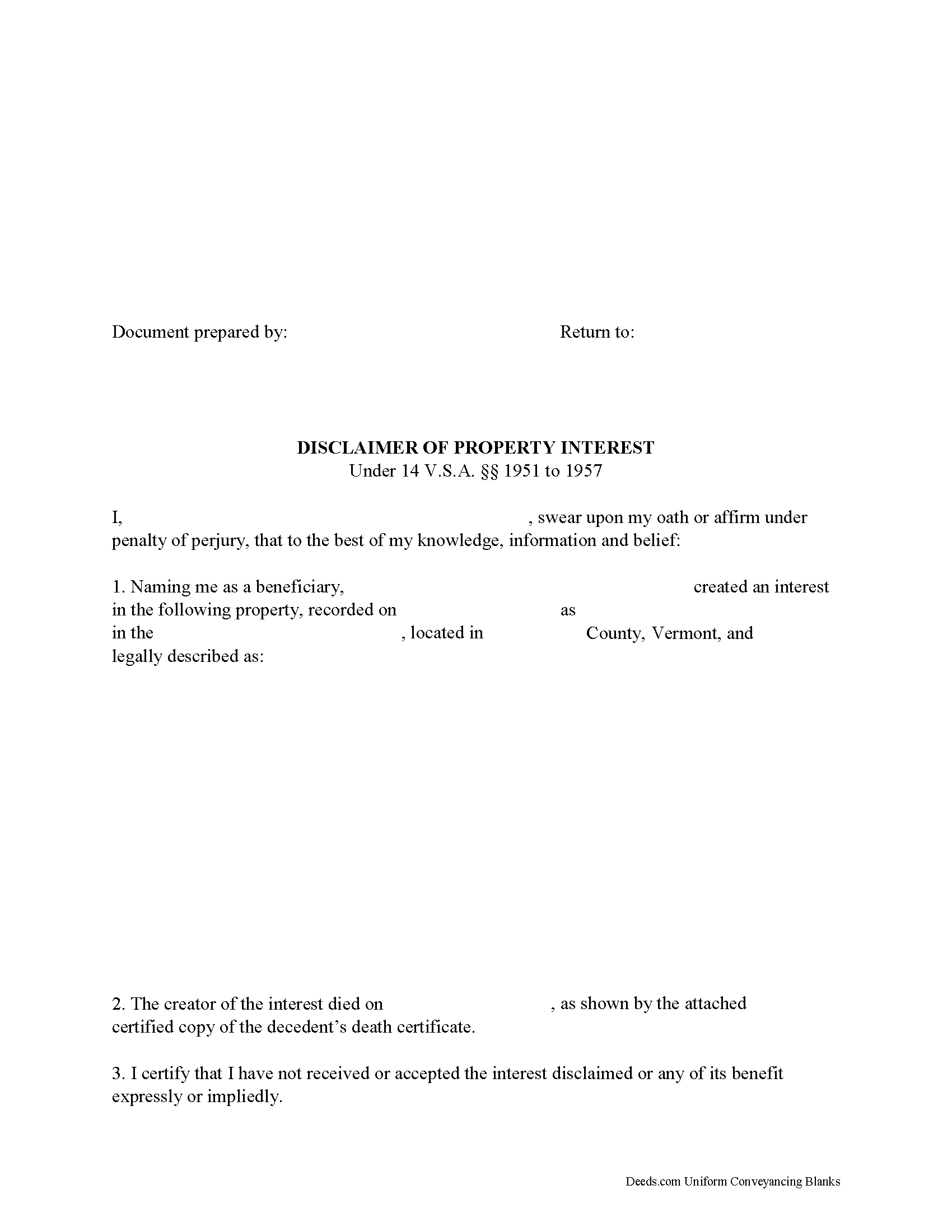
Under the Vermont Statutes, the beneficiary of an interest in property may disclaim the gift, either in part or in full (14 V.S.A. 1951 to 1957). Note that the option to disclaim is only available to beneficiaries who have not acted in any way to indicate acceptance or ownership of the interest ( 1955).
The document must be in writing and include a description of the interest, a declaration of intent to disclaim all or a defined portion of the interest, and be signed by the disclaimant ( 1953).
Deliver the disclaimer within nine months of the transfer (e.g., the death of the creator of the interest), either in person or by registered mail, to any personal representative or other fiduciary of the decedent, to the holder of legal title, or to the person subsequently entitled to the property. In addition, file a copy of the disclaimer in the probate division of the superior court that has jurisdiction over proceedings regarding the estate of the deceased donor ( 1952). If real property is involved, avoid any ambiguity regarding the chain of title by recording a copy of the document in the land records of the town in which the property is located ( 1952 (e)).
A disclaime... More Information about the Vermont Disclaimer of Interest
Certificate of Trust
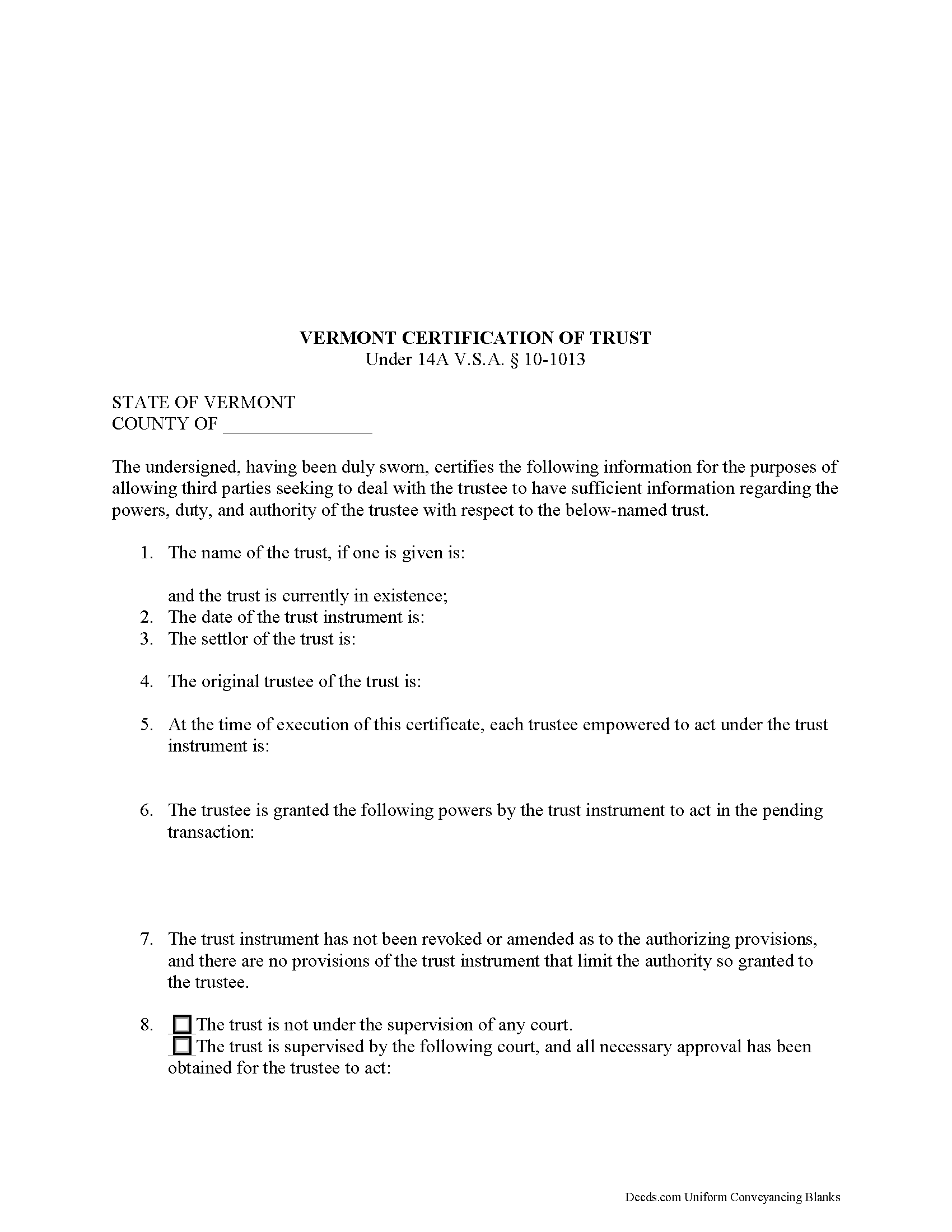
Codified at 14A V.S.A. 10-1013, the certification of trust is a document signed and either presented or recorded by a trustee in order to give notice to parties outside of the trust arrangement that a trust exists and that the trustee has the authority to enter into the transaction at hand. The certificate is made in lieu of recording the entire trust instrument, and is effective "as though the full trust instrument had been recorded, filed, or presented" (14A V.S.A. 10-1013(b)).
The certification of trust presents the trust's name and date, the names of the trust's settlor and original trustee, the name and address of the acting trustee, and a summary of the relevant provisions of the trust authorizing the trustee to act in the transaction at hand.
The document contains certified statements made by the executing trustee that the trust exists; that there are no provisions of the trust instrument which limit the powers of the trustee enumerated within the certificate; and that the trust is either unsupervised by a court, or, if supervised, the trustee has obtained the required approval to act.
A certificate of trust is recorded in support of business involving trust prope... More Information about the Vermont Certificate of Trust
Mortgage Security Agreement and Promissory Note
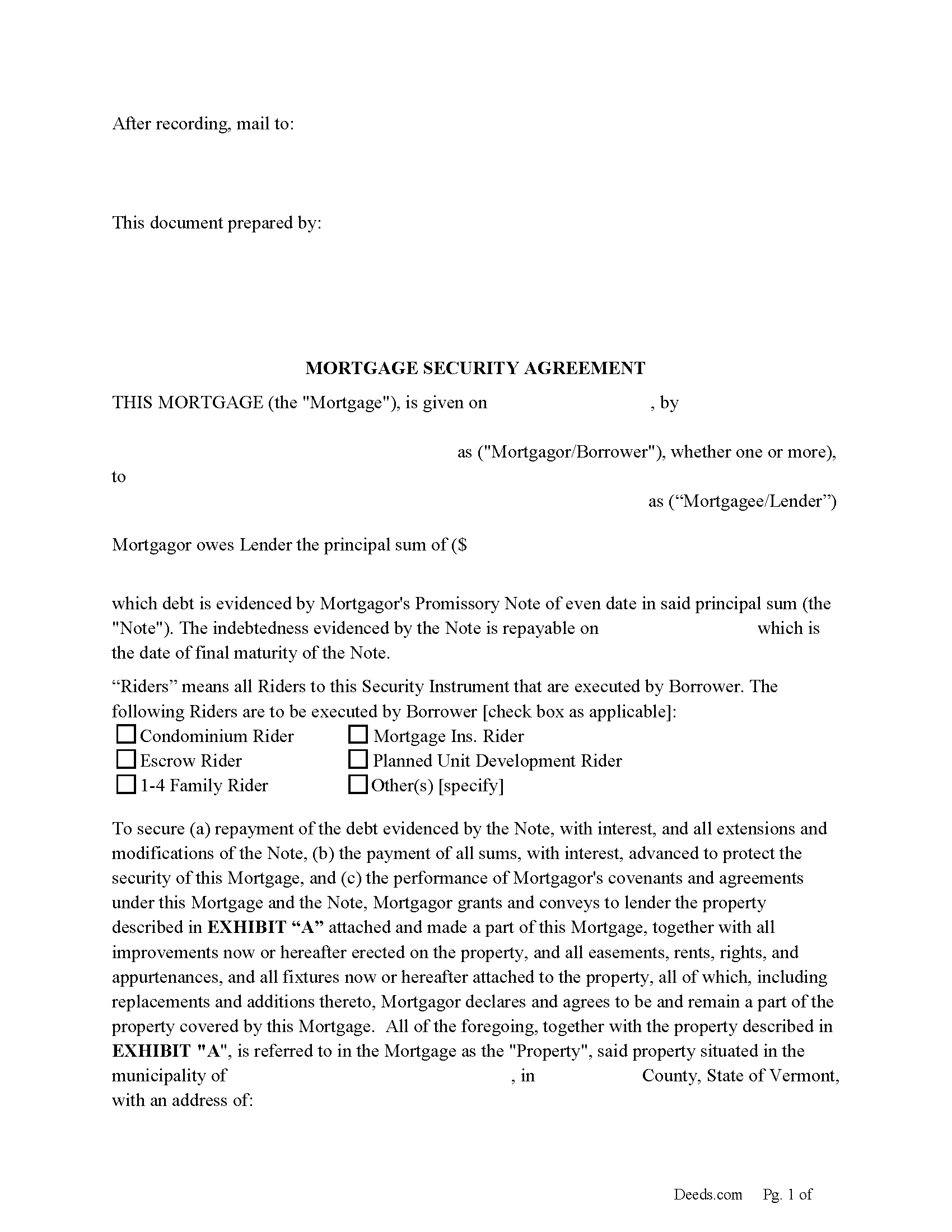
("Mortgage loan" means a loan secured primarily by a lien against real estate.) Use these forms to finance real property; residential property, vacant land, rental units, condominiums, commercial and planned unit developments. (V.S.A. 2101(13) Definitions)
This mortgage contains a power of sale clause pursuant to the provisions of 12 V.S.A. Chapter 172, which allows for a non-judicial foreclosure when applicable, saving time and expense for the lender. A non-judicial foreclosure generally applies to any real property except for a dwelling house of two units or less, that is occupied by the owner as a principal residence, or farmland. If a non-judicial foreclosure is NOT applicable this form allows for a judicial foreclosure.
The debt is evidenced by the Promissory Note that is governed by the State of Vermont. A Mortgage and Promissory Note with stringent default terms and conditions can be beneficial to the lender.
Vermont is a "notice" state. Delivery of a mortgage instrument of real property constitutes constructive notice as of the time it is recorded.
(Vermont Mortgage Package includes form, guidelines, and completed example) For use in Vermont only.
... More Information about the Vermont Mortgage Security Agreement and Promissory Note
Discharge of Mortgage
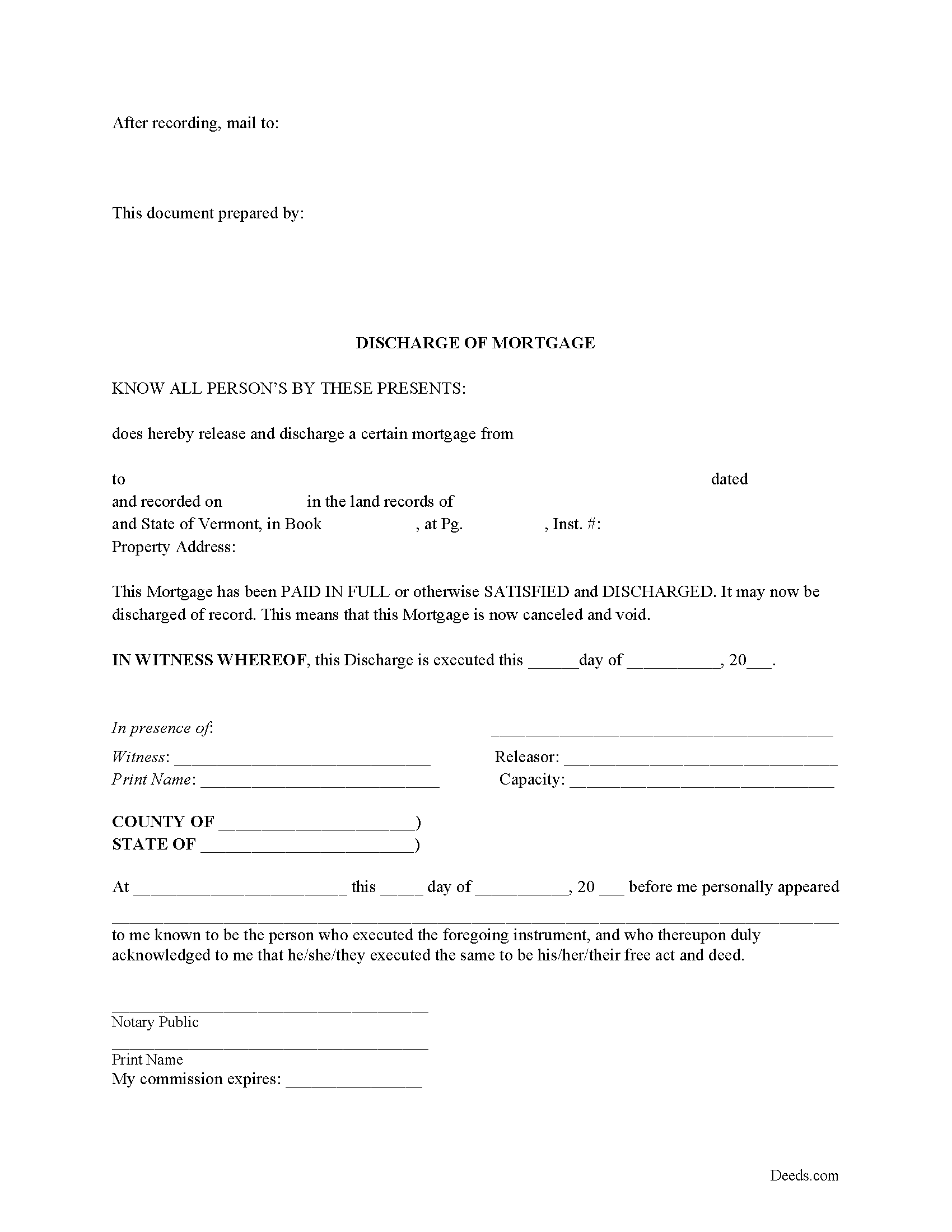
A mortgage may be discharged by separate instrument when (executed by the lender/mortgagee or his or her attorney, executor, administrator, or assigns, which shall be substantially in the following form:
I hereby certify that the following described mortgage is paid in full and satisfied, viz: ______________ mortgagor to ______________ mortgagee, dated ______________ 20____, and recorded in book ______, page ______, of the land records of the town of ________________________________________.) (VSA. 463. By separate instrument)
Included ancillary documents: 1- Line by line guide explaining every blank on the form. 2- An example of a properly completed form for reference.
(Vermont DOM Package includes form, guidelines, and completed example) For use in Vermont only.
... More Information about the Vermont Discharge of Mortgage
Assignment of Mortgage
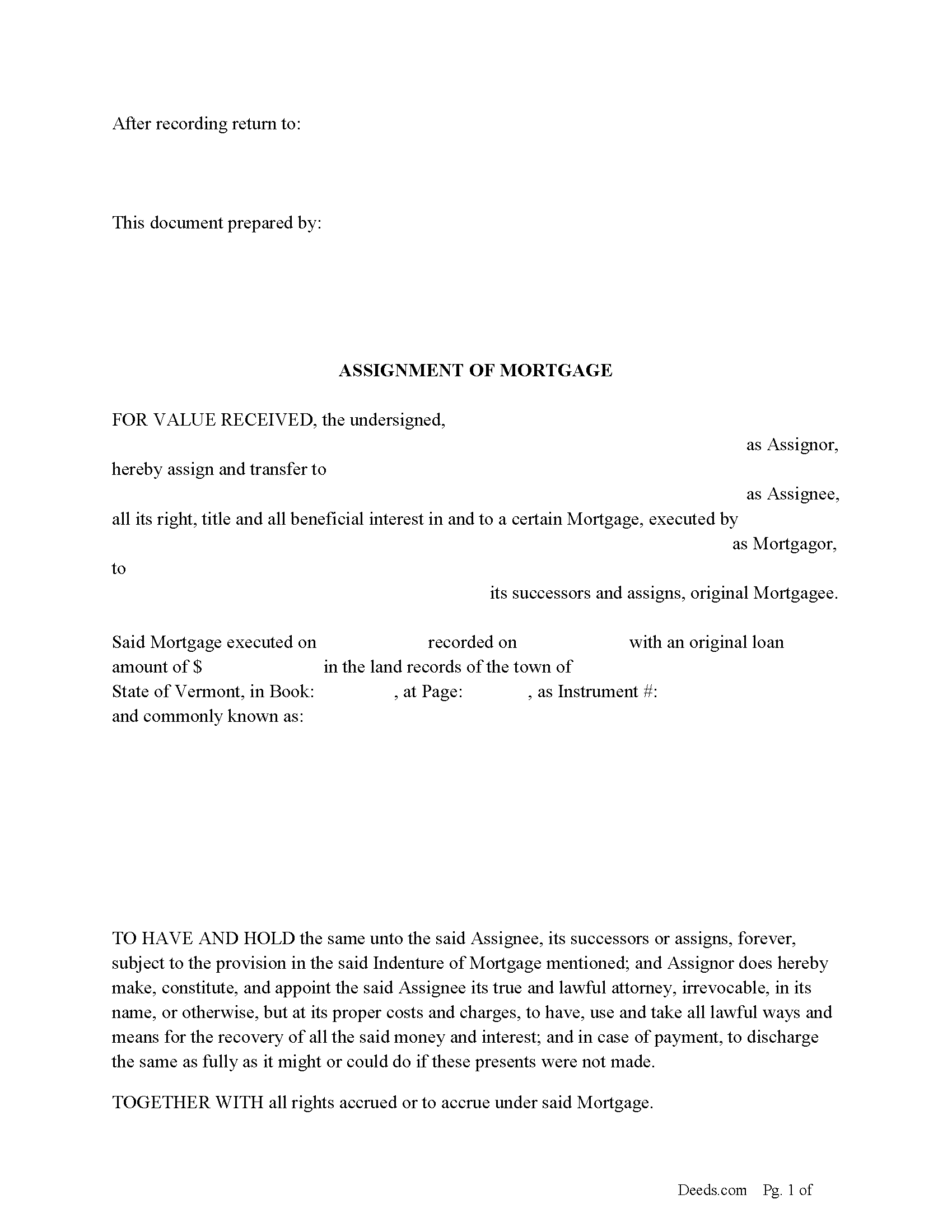
Use this form to assign a previously recorded mortgage to another party.
Vt. Statute 1158 Assignment or discharge of mortgage or judgment lien
An assignment or discharge of a mortgage or judgment lien shall be duly recorded in the records of the town. A mortgage or judgment lien may be discharged by the mortgagee, judgment creditor, or assignee of such mortgage or judgment lien in writing on the margin of the mortgage record or judgment lien notice. A satisfaction or assignment of the mortgage or judgment lien recorded elsewhere shall bear a marginal notation of the book and page of the mortgage or judgment lien record and a corresponding cross-reference shall be made on the margin of the mortgage or judgment lien notice record.
Current Borrowers must be notified of the assignment. Notification consists of contact information of the new creditor, recording dates, recording instrument numbers, changes in loan, etc. Included are "Notice of Assignment of Mortgage" forms.
The Truth and lending act requires that borrowers be notified when their mortgage debt has been sold, transferred, or assigned to a new creditor. Generally, within 30 days to avoid up to $2,000.00 in stat... More Information about the Vermont Assignment of Mortgage
Power of Attorney for the Sale of Real Estate
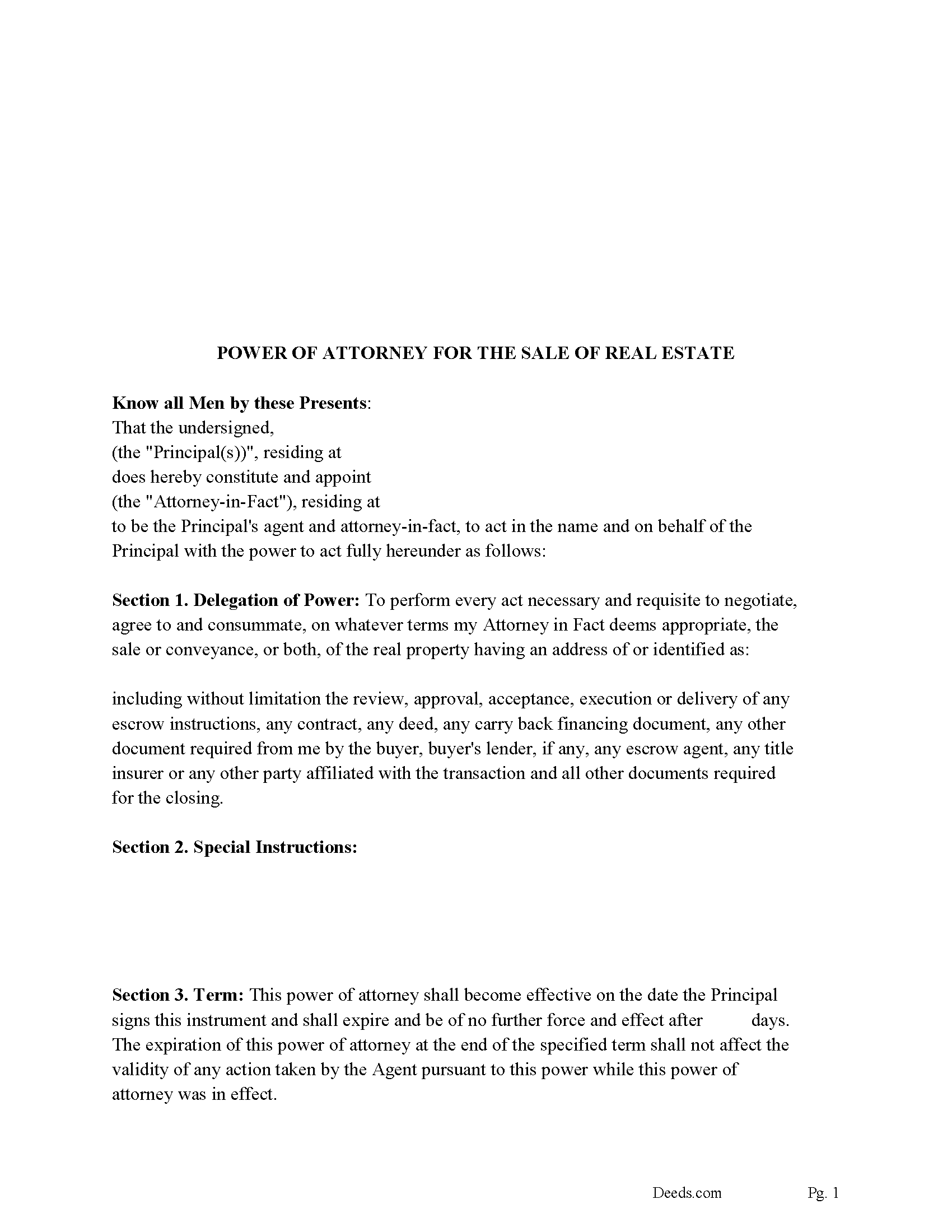
The principal(s) owners of the property appoint an attorney-in-fact/agent to sell a specific property that is located in Vermont.
No agent may convey lands belonging to the principal or an estate or interest therein unless the terms of the power of attorney explicitly provide the agent has such authority and the power of attorney meets the specific execution requirements of section 3503 of this title. 3504(c)
"Agent" means a person named by a principal in a written power of attorney to act on the principal's behalf, and is synonymous with the term "attorney-in-fact". 3501(2)
This power of attorney is durable -"Durable power of attorney" means a written power of attorney in which the authority of the agent does not terminate in the event of the disability or incapacity of the principal. 3501
A power of attorney shall terminate on; (The occurrence of a termination event explicitly specified in the power of attorney) (3507(7)). This power of Attorney terminates upon a specific number of days provided by the principal after its execution, example: 30, 60, 100, etc., days after execution.
Included is a "Special Instructions" section, where the agent's powers can be fur... More Information about the Vermont Power of Attorney for the Sale of Real Estate
Power of Attorney for the Purchase of Real Estate
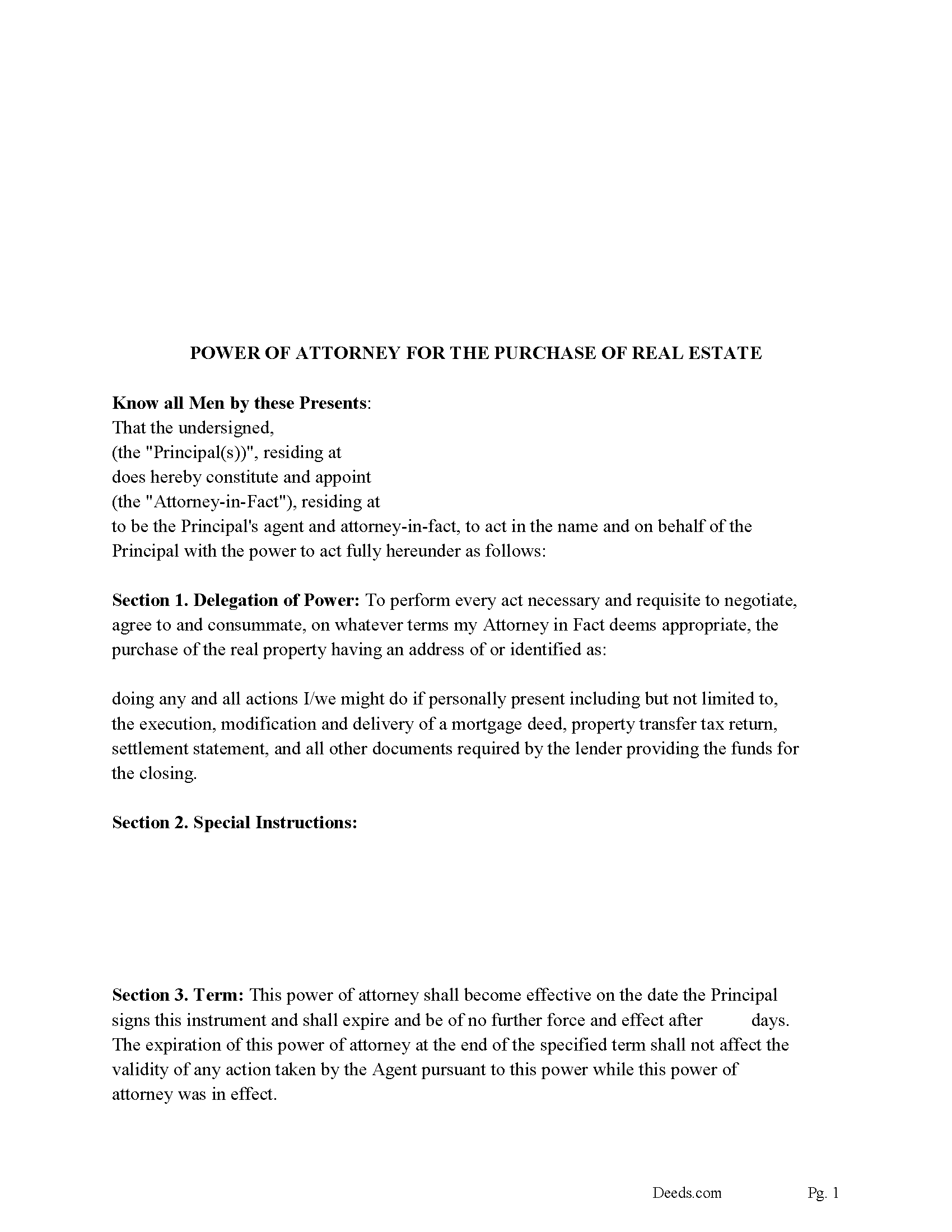
The principal(s) appoint an attorney-in-fact/agent to purchase a specific property that is in Vermont.
No agent may convey lands belonging to the principal or an estate or interest therein unless the terms of the power of attorney explicitly provide the agent has such authority and the power of attorney meets the specific execution requirements of section 3503 of this title. 3504(c)
"Agent" means a person named by a principal in a written power of attorney to act on the principal's behalf, and is synonymous with the term "attorney-in-fact". 3501(2)
This power of attorney is durable -"Durable power of attorney" means a written power of attorney in which the authority of the agent does not terminate in the event of the disability or incapacity of the principal. 3501
This power of attorney includes a "Special Instructions" section, where the principal(s) can further limit or define the Agent's powers.
A power of attorney shall terminate on; (The occurrence of a termination event explicitly specified in the power of attorney) (VSA-3507(7)). This power of Attorney terminates upon a specific number of days provided by the principal after its execution, example: 30, 60... More Information about the Vermont Power of Attorney for the Purchase of Real Estate